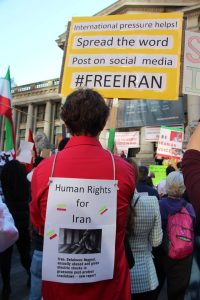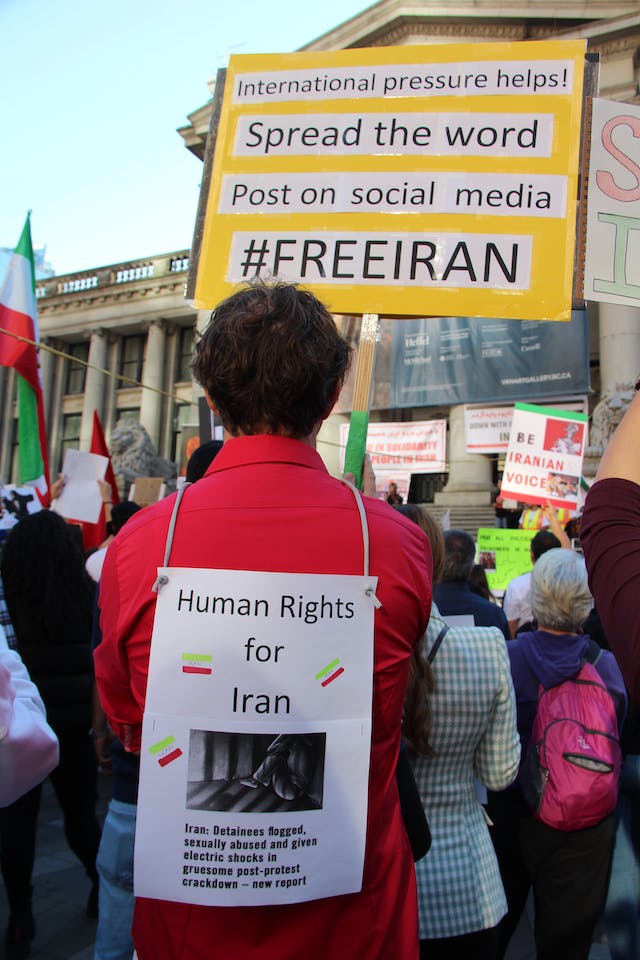US Considers :1Retaliation Blaming Iran

The US considers retaliation after blaming a group of militias supported by Iran for a deadly drone attack in Jordan.
As President Joe Biden considers his options for responding to the drone strike that killed three U.S. service members in Jordan on Wednesday, the United States attributed the attack to the Islamic Resistance in Iraq, a loose coalition of militias supported by Iran.
After the United States declared it held Tehran accountable, Iran threatened to “decisively respond” to any attack on the Islamic Republic.
Following the Sunday drone attack that also injured over 40 troops at Tower 22, a covert base in northeastern Jordan that has been essential to US presence in neighboring Syria, the U.S. has indicated it is preparing for retaliatory strikes in the Middle East.
The Islamic Resistance in Iraq, an umbrella organization that includes the militant group Kataib Hezbollah, is thought to have planned, resourced, and assisted the attack, according to National Security Council spokesman John Kirby on Wednesday.
Biden “thinks that it is important to respond in an appropriate way,” the speaker stated.

He said that Biden was still considering his options, but Kirby assured him that it “won’t be a one-off” and that “the first thing you see won’t be the last thing.”
The Iraqi militia Kataib Hezbollah announced in a statement that “the military and security operations against the occupation forces are being suspended in order to prevent embarrassment to the Iraqi government,” but Kirby disregarded the statement.
The group cannot be taken at face value, he stated, and he went on to say, “They are not the only group that has been making threats against us.
According to the U.S. military, as of Wednesday, Kataib Hezbollah and other militias aligned with Iran had carried out 166 attacks against U.S. military installations since October 18.
These attacks had occurred in Jordan, Syria, and Iraq, accounting for 67 of the total.
Over the previous three months, the U.S. has retaliated against the militias on a few occasions. U.S. fighter jets attacked two weapons and ammunition storage facilities near Boukamal, eastern Syria, on October 27, targeting groups supported by Iran and the Islamic Revolutionary Guard Corps.
Additionally, on November 8, fighter jets dropped bombs on an IRGC weapons storage facility in Deir el-Zour, close to Maysulun.
Additionally, a training center and a safe house in Mayadin’s Bulbul neighborhood were the targets of US airstrikes on November 12.
The United States launched strikes on three sites in Iraq on December 26th, targeting Kataib Hezbollah and its affiliates.
Three days later, on January 23rd, the United States struck three sites in Iraq, once more targeting the organization.
Any more American strikes might exacerbate the tensions in the area, which are already high due to Israel’s ongoing conflict with Hamas in the Gaza Strip.
US Considers :1Retaliation Blaming Iran

On October 7, Hamas launched an attack on Israel, resulting in the deaths of about 1,200 people and the kidnapping of about 250 more.
Since then, Israeli attacks have resulted in the deaths of over 26,000 Palestinians and the forced displacement of almost 2 million others, inciting indignation among Muslims worldwide.
The Middle East has descended into chaos as Iran strikes targets in Syria, Iraq, and Pakistan while the United States launches airstrikes against Yemen.
Houthi rebels, who have attacked ships in the Red Sea, have received support from Iran. A fresh round of strikes aimed at Iran, according to some observers, may trigger a wider conflict in the region.
Speaking about military operations under anonymity, a U.S. official said that on Wednesday, 10 Houthi drones that were ready to take off were struck and destroyed by American F/A-18 fighter jets.
Later on Wednesday, the USS Carney, a guided missile destroyer, shot down one anti-ship ballistic missile that was fired toward the Gulf of Aden from Houthi-controlled areas of Yemen, according to a statement released by the U.S. military’s Central Command.
According to Central Command, the Carney also brought down three Iranian drones.
Iran’s ambassador to the UN in New York, Amir Saeid Iravani, was the one who initially issued the warnings. He delivered a
Iranian journalists received a briefing late on Tuesday, as reported by the official news agency IRNA.
Iravani was quoted by IRNA as saying, “The Islamic Republic would decisively respond to any attack on the county, its interests, and nationals under any pretexts.”
Without providing more details, he called any potential Iranian retaliation a “strong response.”

Requests for clarification or comments regarding Iravani’s statements were not answered by the Iranian mission to the United Nations on Wednesday.
Iravani further denied that there had been any communication between the United States and Iran in the past few days, either directly or through middlemen.
Al Jazeera, a Qatar-funded pan-Arab satellite channel, previously reported that this kind of communication had occurred. Qatar frequently acts as a go-between for Washington and Tehran.
However, the Iranian government has noted the threats of retaliation made by the United States for the attack on the base in Jordan.
General Hossein Salami, the commander of the Revolutionary Guard and the only person who reports to Supreme Leader Ayatollah Ali Khamenei, stated at a gathering on Wednesday that “sometimes our enemies raise the threat, and nowadays we hear some threats in between words by American officials.”
We inform them that you have encountered us and that we are acquainted. We always have a response ready for any threat.
He continued, “We have no fear of war, but we are not after war,” according to IRNA.
According to Kirby, the United States does not “seek a war with Iran.” We’re not trying to find a bigger fight.
A general overseeing Iran’s air defenses on Saturday detailed
they were in a state of “maximum defensive preparedness.”
That also raises questions for commercial aircraft passing over and through Iran.
All 176 people on board a Ukrainian passenger plane were killed when Iranian air defenses accidently shot it down in 2020, following the death of a top general by a U.S. drone strike.
The United States is continuing its counterattacks in the Red Sea while the Houthis continue their attacks.
A ship was the target of a missile fired from a private security company, Ambrey, on Wednesday night.
The ship was located close to the Bab el-Mandeb Strait, which separates the Gulf of Aden from the Red Sea, southwest of Aden, Yemen.
The Koi was a container ship flying the flag of Liberia when the Houthis claimed to have attacked it.
The ship’s managers could not be reached for comment right away.
It was not clear what harm or casualties the reported missile attack had caused.
The guided missile destroyer USS Gravely was the target of a missile launched on Tuesday night, according to a statement from Central Command. There were no reported damages or injuries.
In a statement released on Wednesday morning, Brig. Gen. Yahya Saree, a spokesman for the Houthi military, took credit for the attack and described it as “a victory for the oppression of the Palestinian people and a response to the American-British aggression against our country.”
Saree asserted that the Houthis fired “several” missiles, a claim that the US Navy refused to confirm. Claims made by the Houthis have historically been exaggerated, and occasionally their missiles miss their targets due to land-based crashes.
The rebels have been attacking ships in the Red Sea on a regular basis since November over Israel’s assault in Gaza targeted Hamas.
However, they have regularly targeted ships that have shaky or unclear ties to Israel, endangering shipping along a vital route that connects Asia, the Middle East, and Europe.
On Friday, the Houthis fired a missile at a commercial vessel, starting a fire that raged for hours.
When allied warships patrol the waterways impacted by the attacks, the United States and the United Kingdom have launched several rounds of airstrikes against the Houthis.
The top diplomat for the European Union announced on Wednesday that the organization intends to begin a naval mission in the Red Sea in three weeks to assist in defending cargo ships from Houthi attacks.
Writers Nasser Karimi of the Associated Press in Tehran, Iran; Tara Copp and Lolita C. Baldor contributed to this report from Washington.
READ MORE:
1. Health and Fitness Tips for You
2. Upcoming New Movies
3. Get New Jobs Directly From Companies FREE Visa
4.Latest News of Cryptocurrency and Bitcoin
5. Real Estate Business for you
6. Latest News
7. Best Insurance Policy for Everyone
READ MORE:
- 1. Strategic Management Process: Top5 Jobs In Dubai FREE VISA Apply Now
- 2. Vancouver Time fighting for $12,000 in travel insurance Nightmare FREE
- 3. DIABETIC DIET : A PROFESSIONAL’S GUIDE TO A WARM AND WELL-BEING
- 4. NICOLAS CAGE STATES : HE HAS 3 OR 4 MORE MOVIES LEFT NOW
- 5. EMPRESS CRACKS: FOR THE FIRST TIME SINCE APRIL
- 6. DESPITE MEANING: DESPITE HIGH RATES, MORE US HOME BUYERS ARE WILLING TO BUY
- 7. A 44-YEAR-OLD BOSTON WOMAN WAS KILLED BY A SHARK ATTACK IN






